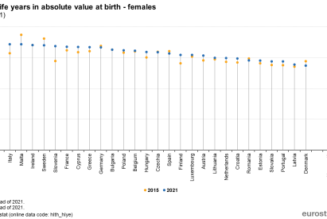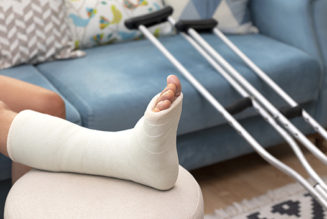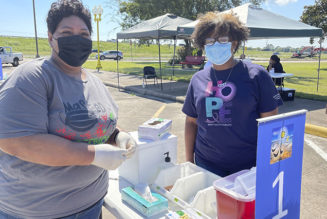Ask people if they want to live to 100 and may will say no, because they don’t want to be a burden to their kids—sick or disabled and requiring lots of care. But what if you could reach very old age and remain fit enough to run a 10K or hike steep trails—or at least live independently and keep pace with your great-grandkids as they tear around your house? Ahead: Experts’ top secrets for healthy aging.
Scientists are shifting their attention from simply helping people celebrate many birthdays to making those older years great ones, says Matt Kaeberlein, Ph.D., CEO of Optispan and a former director of the Healthy Aging and Longevity Research Institute at the University of Washington. In other words, rather than simply extending your life span by focusing on better treatments for previously terminal diseases like cancer, heart disease, and chronic obstructive pulmonary disease (COPD), they want to boost your health span, defined as the number of years you go about your life alert, engaged, and active, says Stephen Kopecky, M.D., a cardiologist at the Mayo Clinic and author of Live Younger Longer. Having a longer health span doesn’t mean you’ll never get sick or develop a chronic condition, but rather that if you do, it won’t put too big a crimp on your later years. The idea is to push off the time when you might need a wheelchair or experience failing memory to only your last days or months.
Today, the average American gives up more than a decade of their potential health span to disease or disability, Kaeberlein says, but that doesn’t have to be the case. Already scientists know about ways to optimize those later years through lifestyle changes. As research continues, they will undoubtedly discover other approaches for keeping us healthier longer, including with potential new drugs. “An improved understanding of the biology of aging will form the crux of 21st-century medicine,” Kaeberlein predicts.
What makes cells elderly?
Most of the conditions we associate with aging start in our cells and tissues before they become visible as, say, heart disease or COPD. Health span scientists are trying to figure out what exactly happens in those cells and tissues that causes them to get so messed up, so as to counter these processes. The list so far includes dysfunctions of mitochondria, the engines of cells; shortening of telomeres, substances at the ends of DNA that act like shoelace tips to keep chromosomes from fraying; and glitches in information conveyed by one part of a cell to another.
Lifestyle and the environment we live in are part of the picture of our cellular aging process, as are our genes. Researchers know this in part from studying mice and other lab animals—and, more recently, pets. Kaeberlein started the Dog Aging Project a few years ago because our furry friends are in many ways like people—subject to the effects of stress, environmental toxins, and less-than-ideal diets (table scraps, anyone?). But since they age approximately seven times as fast as we do and thus get old more quickly, we can learn a lot from what they go through. (He invites anyone to register their dog with the Dog Aging Project and periodically provide updates on the pooch’s health.) In the meantime, it’s become clear that things we know are bad for us, like high blood sugar and lack of exercise, do their dirty work by causing cellular dysfunction. This means that the same things that are known to prevent conditions like diabetes and heart attacks are also effective at targeting the biology of aging, Kaeberlein says.
As experts learn more about expanding health span, some of this advice may evolve. Currently, the tools on the following pages are the best ones we can all use to be our healthiest now—and well into the future.
Live better longer strategy #1: Address your stress
We all worry, but feeling chronically stressed speeds up aging, says Elissa Epel, Ph.D., director of the Aging, Metabolism, and Emotion Center at the University of California, San Francisco. Stress fuels the low-grade inflammation that damages cells, affects the length of telomeres, and more, she says.
Take breaks in nature
“Urban forest therapy” means connecting to nature—even a single tree—wherever you live. A recent review confirmed that even short nature breaks were great for reducing angst, with one study clocking benefits after just 20 to 30 minutes a few times each week.
Mentally time-travel
One quick way to reduce stress is a type of perspective-taking called “time distancing,” which Epel recommends and often uses herself. Think about your biggest worries and ask yourself how much they will matter a week, a month, a year, or decades from now. What we’re sweating over today will almost always seem meaningless later. You can feel relief each time you remind yourself of this.
Schedule “inner-me” time
Meditate, journal, or go for a run to get into a Zen-like space, suggests Anu Lala, M.D., a cardiologist at Mount Sinai Hospital. Spending time going within will also inspire you to stay on track with other routines that help reduce stress. “The days I take the time to meditate are the days I do the most healthy eating and exercise,” Dr. Lala says.
Designate a phone-free zone
We’re all conditioned to check our smartphones dozens of times a day, but researchers are linking too much screen time to stress, anxiety, and poor sleep. Cutting back—by, say, making Saturday morning a phone-free period in your home—lowers stress levels, especially when you use that time to move your body, German researchers discovered.
Live better longer strategy #2: Be aware of your blood sugar
Consistently high levels of glucose in your blood, or levels that frequently swing a lot from high to low and back again, damage many cells in the body, which sets the stage for diseases like diabetes and heart disease. Over time, having these conditions further decreases health span.
Eat a Mediterranean diet
A Mediterranean-style diet, full of vegetables, fruits, and high-quality fats (olive oil, nuts) and proteins (lots of fish), is not only ideal for overall health but also the best way to keep blood sugar in check, Dr. Kopecky says. If you don’t currently eat this way, start by having a healthful salad before dinner. A single daily serving of leafy greens may help protect the brains of older adults, Rush University researchers discovered.
Go green with your tea
Japanese researchers found that drinking green tea lowered blood glucose levels in people without diabetes. One reason, the scientists discovered: Regularly consuming the beverage reduces the amounts of unhealthy bacteria that colonize the gut.
Try acupuncture
If you already have diabetes, consider adding acupuncture to your regular drug treatment; it stabilizes blood sugar more than conventional therapy alone, Chinese researchers report.
Track your sugar
Individuals at high risk for heart disease and prediabetes (high-ish levels that don’t quite cross the diabetes threshold) may benefit from seeing how their blood sugar reacts to individual food choices, which can be done by using a continuous glucose monitor. Dr. Lala suggests that if your A1C is above the safe limit of 5.7 despite appropriate diet and exercise optimization, ask your doctor if temporarily wearing such an under-the-skin monitor could help you make better food choices for your body.
Live better longer strategy #3: Move your body
Regular exercise, of course, keeps muscles strong to help us stay active in old age, but it does much more for our health spans, including stimulating anti-inflammatory activity throughout the body and keeping cell-damaging insulin levels in check.
Do that extra bit
You know that we all need some formal cardio—whether it’s walking, running, swimming, or pickleball—totaling at least 150 minutes each week (doing it in spurts is fine). But it’s also wise to move all day long, Dr. Kopecky says. Walk around your office every half hour, sweep your kitchen before plopping in front of the TV, and yes, take the stairs whenever possible.
Get your strength training in
Some form of resistance training—whether lifting weights, using resistance bands, or doing body-weight exercises that challenge muscles—is crucial, Kaeberlein says. “The loss of lean muscle mass is one of the biggest predictors of frailty in the elderly,” he adds.
Up your protein
Muscles grow when you feed them protein, but research shows that current daily recommendations may not be enough for optimal strength as we age. “Personally, I aim to double the current target to 1.5 g per kilogram of body weight,” says Kaeberlein. This means if you’re a 150-pound woman, you’d want to take in 102 g of protein daily. Reach this level by including some protein—from high-protein foods like nuts, eggs, soy protein, lentils, fish, meat, and even rye bread—in every meal. A recent study in people between the ages of 55 and 70 who were strength training and cutting calories to try to lose weight found that eating sufficient protein was best for maintaining a healthy muscle-to-fat ratio, while restricting calories alone caused loss of muscle strength and function.
Say “ommm”
“Yoga improves muscle tone and balance,” says Dr. Lala, which helps prevent falls and will let you do daily activities with ease. An added benefit: Yoga’s breathing exercises reduce stress.
Live better longer strategy #4: Be heart smart
Heart disease doesn’t only kill nearly 700,000 people a year; it leaves many more unable to lead active, thriving lives. “Prevention strategies are beneficial at every stage,” whether your heart is completely healthy or you have cardiovascular warning signs like high blood pressure or high cholesterol, and even if you’ve already had a heart attack, Dr. Lala says.
Rediscover your kitchen
Of course it’s easier to grab takeout on your way home, but when you cook, you get to control portion sizes, use healthful ingredients, and limit hidden sugars and trans fats. Make cooking fun by discovering new recipes, including those on the National Institutes of Health’s Healthy Eating website.
Explore fermented foods
Miso, natto, tofu, and kefir aren’t commonplace in many American kitchens, but they should be in yours. Japanese researchers found that the risk of developing high blood pressure dropped by up to 28% in those who regularly ate fermented soy products (e.g., miso and natto). In another study, three months of daily drinking of the fermented dairy product kefir—great for breakfast—boosted heart blood markers and lowered heart disease risk.
Call your friends
People who feel lonely have a higher risk of heart disease and stroke, not to mention depression. Sign up for that group belly dance class or lecture series, or start a Zoom book club with friends. Just picking up the phone and chatting with someone for 10 minutes a few times a week significantly reduces loneliness, researchers discovered during the height of the pandemic.
Guard your nights
Sleep is one of the most important things you can do to improve your health span, Dr. Kopecky says, as this is when crucial tissue is repaired, including that in your heart. Yet a third of American adults don’t get enough zzz’s. Improve your sleep hygiene by keeping to the same sleep schedule every day (including weekends) and creating a bedtime routine similar to the kind you had for your kids, perhaps involving a soothing bath, reading, meditating, and/or writing down things you’re grateful for.
In the future, will we live forever?!
OK, this is an overstatement, but at some point there will be therapies that get us closer to it. “Longevity interventions have moved from science fiction to science fact. We now know many processes in the body to target,” Kaeberlein says. While so far the action has been only in the lab, additional studies in humans could one day lead to effective drugs. Here’s what researchers are tinkering with:
- The drug rapamycin activates natural pathways that protect and rejuvenate cells. Dozens of studies in mice found that it delayed and sometimes reversed age-related decline; one showed that rapamycin-fed rodents had better coordination and memory and less frailty than others.
- A class of drugs called senolytics act like internal vacuum cleaners, sucking up defective, “senescent” cells that also deform other cells.
- Taurine is an amino acid that has been suggested in small studies to tame the inflammation behind diseases of aging.
- Gene therapy—i.e., inserting a healthy gene into cells to replace a defective one—is being tested to counter certain cellular aging processes, including the shortening of telomeres. (Once telomeres become too short to divide, the cell dies.)
- Gene-editing snippers like CRISPR/Cas9, which removes mutations from genes, may one day conquer genetics-based, health span–robbing scourges like Parkinson’s and Alzheimer’s disease.

Meryl is an award-winning journalist and author whose latest mindfulness/yoga novel, Warrior Won, was awarded an Independent Publisher Book Award (IPPY).









